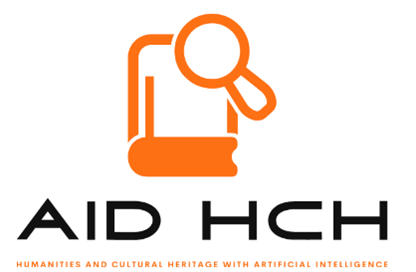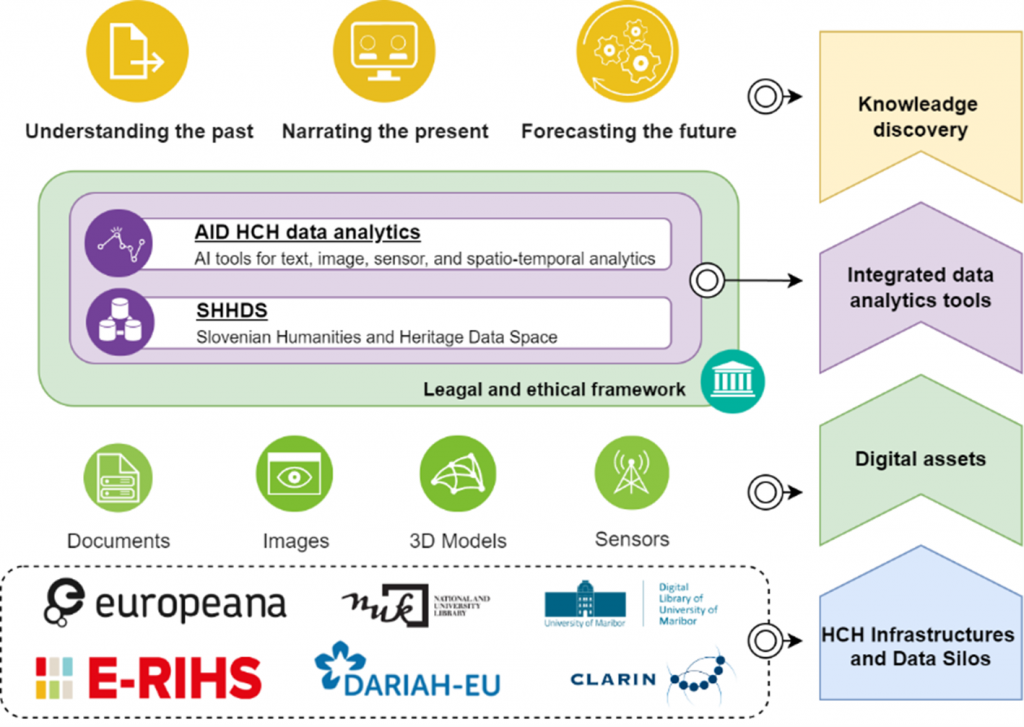
Description:
Artificial intelligence (AI) is increasingly used in research, especially in natural sciences, engineering and medicine, but to a much lesser extent in the humanities. The appropriate understanding of the potential of artificial intelligence (AI) in humanities research and in the preservation of cultural heritage (CH) is the main goal of the project, which also aims to develop methodological and theoretical frameworks, and to define ethical and legal considerations for the most effective and appropriate use of AI in the humanities. The appropriate use of high-tech computing tools significantly contributes to the research of the constantly growing number of digitised sources and data, offering unprecedented opportunities to upgrade research in the humanities and more effectively evaluate and preserve CH. It is of crucial importance to preserve CH in its original form, while at the same time preserving and enhancing European national and social capital. Slovenia is significantly underperforming in this field. It is a demanding, but necessary and for Slovenian conditions a completely new research challenge. This is why researchers from the humanities, heritage science, law and computer science, as well as librarians and heritage experts from various Slovenian universities and public institutions, have joined efforts.
Objectives:
AID HCH project proposes an intensive interdisciplinary research programme that holistically addresses the digital transformation of humanities research and CH research by enabling the development of new methodologies based on knowledge discovered through the fusion of large disperse and heterogeneous digital data sources with the aid of AI. This will be achieved within the following specific objectives:
- to research and develop legal and technical basis for responsible data sharing in humanities and CH research;
- to develop new methodological approaches in humanities and CH research with the aid of AI;
- to go beyond the state-of-the-art by applying the proposed methodology in use case domains;
- to ensure the long-term sustainability of project results and their alignment with the European Collaborative Cloud for Cultural Heritage activities.
Global development is focusing on the creation of data spaces, linked with the European Collaborative Cloud for Cultural Heritage (ECCCH), in which Slovenia currently does not participate due to the absence of a coordinated national initiative. Despite the growing number of digitized resources offering new opportunities for heritage science research and preservation, the potential of high-tech tools remains underutilized. Slovenia faces similar challenges as other EU countries, including issues with standardization, data-sharing ethics and intellectual property, and insufficient data harmonization.
The AID HCH project aims to introduce Slovenia’s first data space for responsible data sharing in humanities and cultural heritage research. By integrating AI tools for quantitative extraction of metrics from texts, images, 3D models, and sensors, the project will offer new insights into historical analysis, digital storytelling, and conservation. It will empower researchers and educators with tools to build complex knowledge networks, enhance research communication, and improve the preservation and understanding of cultural heritage.
Research Challenges
AID HCH addresses three major challenges:
- Understanding the past. Overcoming labor-intensive evaluations of dispersed historical data.
- Telling the present. Combining diverse datasets into meaningful narratives about cultural heritage objects.
- Predicting the future. Developing AI-based predictive maintenance models for preventive conservation.
The use of dedicated set tools and AI will be demonstrated on three specific cases:
- research on the history of women in Venezia Giulia during the first half of 20th century and on the history of Slovene (national) identity;
- on heritage interpretation and conservation-restoration predictive modelling;
- taking into account indoor and outdoor climate data and using them by improving preventive conservation decision-making.

Partnership:
AID HCH (J7-6012) is a three-year project starting on 1 January 2025, funded by the Slovenian Research and Innovation Agency (ARIS) with a total budget of €1.5M. The project involves key Slovenian institutions working towards integrating AI into heritage science and fostering innovative research practices:
- University of Maribor (Faculty of Arts, Faculty of Electrical Engineering and Computer Science, Faculty of Law, Faculty of Mechanical Engineering) (Coordinators: Prof. Dr. Gorazd Bajc, Prof. Dr. Domen Mongus)
- University of Ljubljana (Faculty of Chemistry and Chemical Technology)
- University of Primorska (Faculty of Humanities)
- National and University Library of Slovenia (NUK)
- University Library Maribor
- Slovenian National Building and Civil Engineering Institute
- Institute for the Protection of Cultural Heritage of Slovenia
Impact and European Collaboration
AID HCH aligns with European research initiatives such as E-RIHS (European Research Infrastructure for Heritage Science), CLARIN (European Research Infrastructure for Language Resources and Technologies), and DARIAH (European Digital Research Infrastructure for the Arts and Humanities). By developing the Slovenian Reference Humanities and Heritage Data Space (SHHDS), the project contributes to the digital research infrastructures essential for Slovenia’s integration into the broader European research landscape.
By pioneering AI-driven methodologies and establishing a national data space for humanities and cultural heritage research, AID HCH will take a significant step towards ensuring Slovenia’s active participation in the European Collaborative Cloud for Cultural Heritage and beyond.
